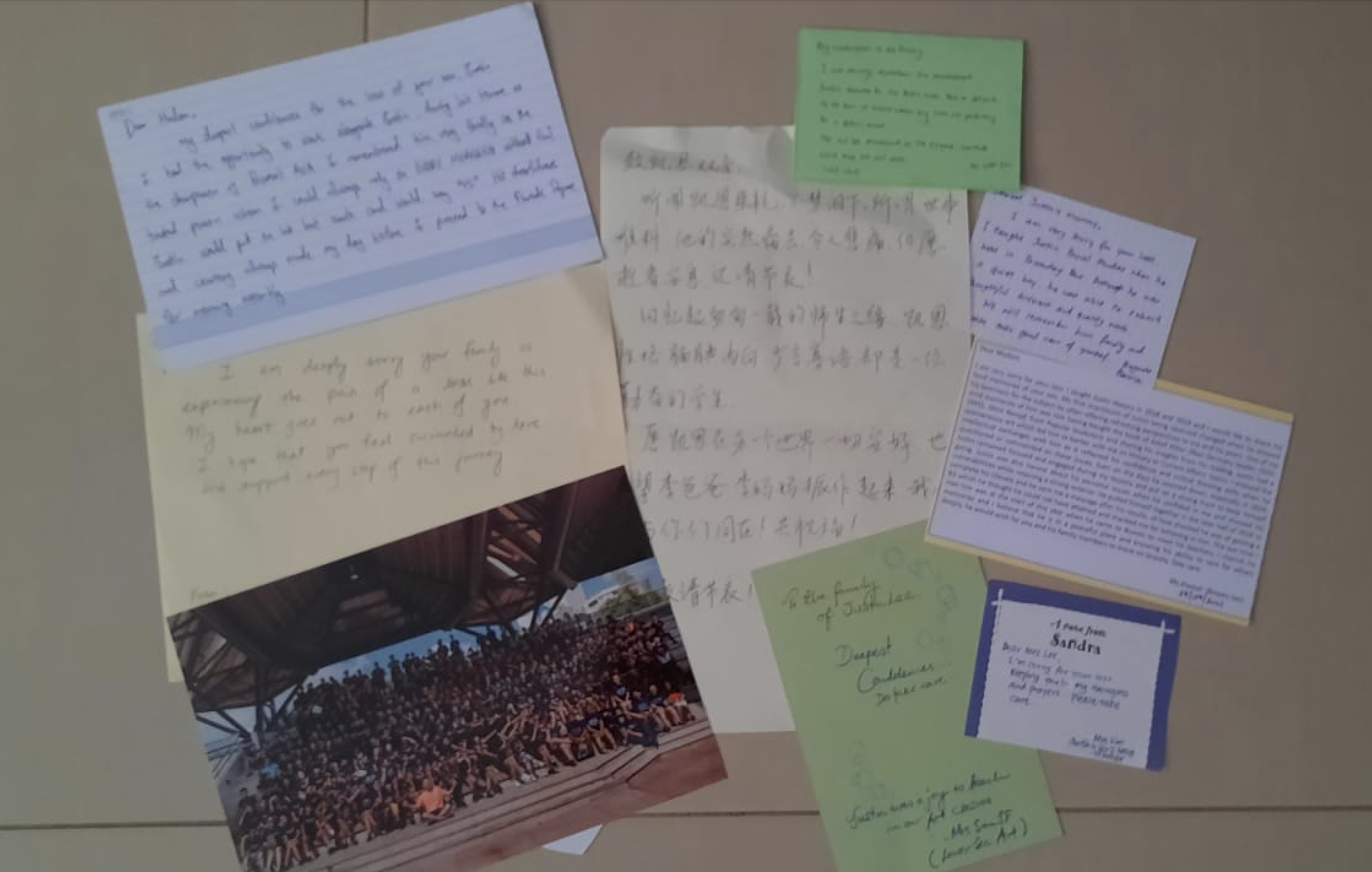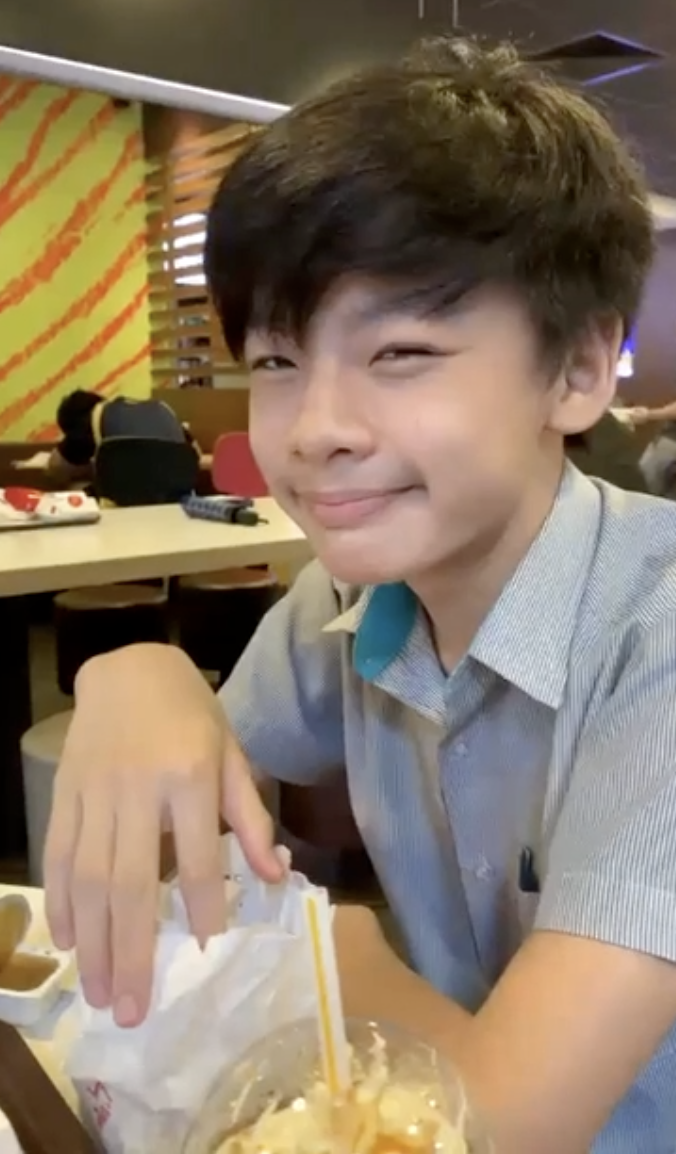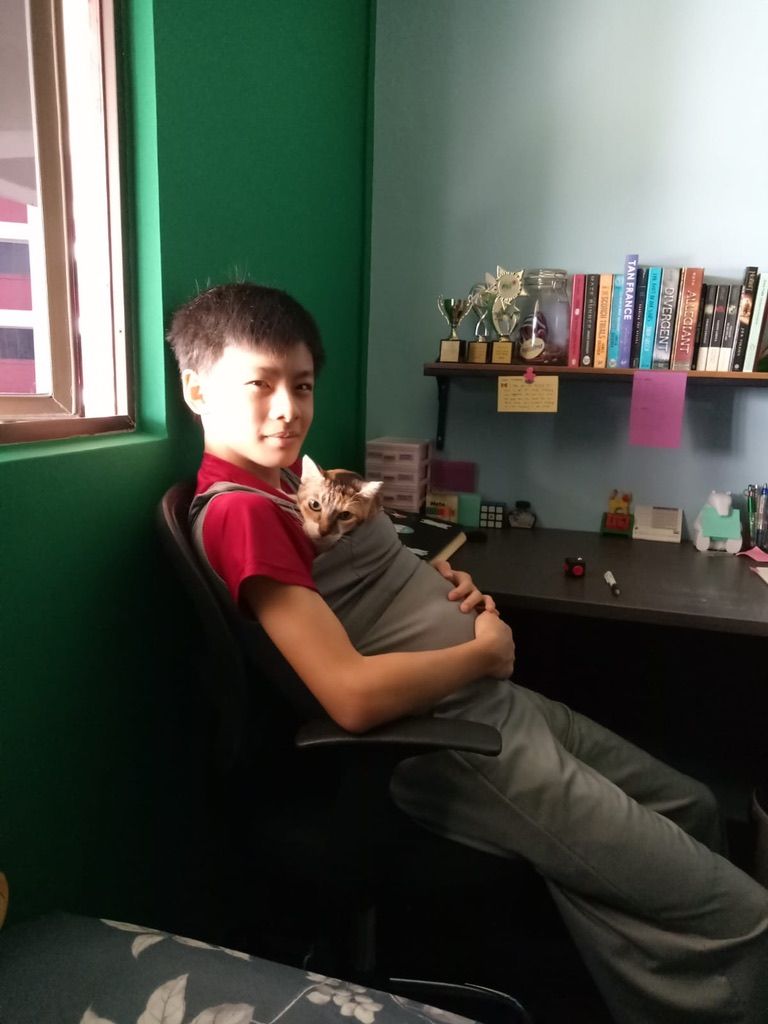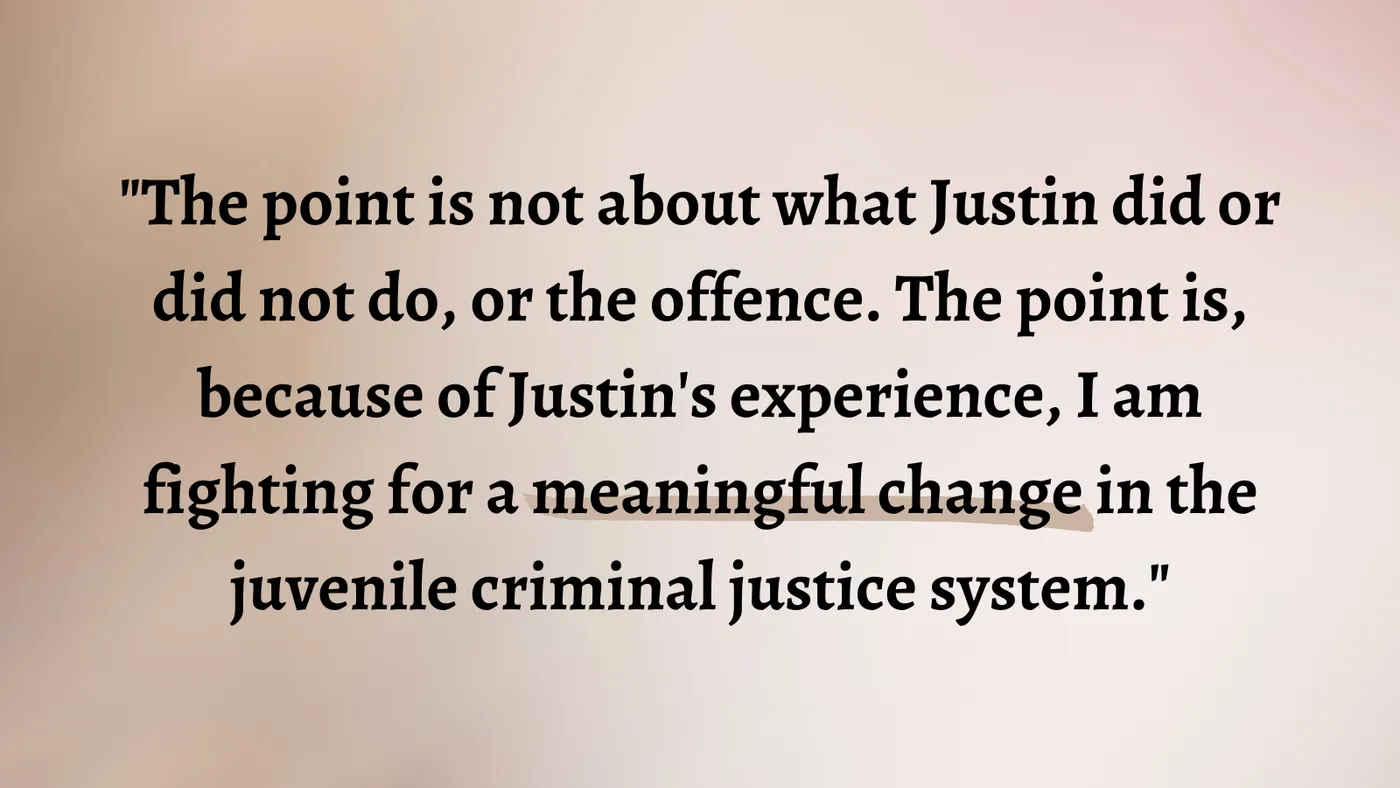cw: Mentions of police investigations, suicide/death
You might have already seen this viral post by Cecilia Ow on Instagram or Facebook, in which she shared a letter to Minister for Home Affairs and Law, K Shanmugam, about her son, Justin Lee. Justin died on 16 September this year, after falling 12 storeys. He was only 17 years old. Cecilia's sure that he died by suicide, and that it was connected to an investigation conducted by the Central Narcotics Bureau, which ended in Justin being charged for trafficking drugs.
Over the weekend, I met up with Cecilia and we talked about her son, the investigation, and her demands for meaningful reform in the juvenile justice system in Singapore. I’m presenting it here in a Q&A format because I want this to be in her own words as much as possible.
The transcript has been edited for length and clarity, and I’ve added some interjections here and there (in bold, alongside the questions I asked) for background.
Let’s start with Justin. What do you want people to know or remember about him?
I think the first thing that stands out about Justin is his love for F1. He is very, very passionate about F1. He follows all the races every season. So usually it's on the weekend, and he would try to make it home on time to catch it the action live on his laptop. He's so into it that he would tell me, oh, can we go to this country, or that country? You know, there's this F1 race going on at that time, that month… And he will buy F1 merchandise, like caps and T-shirts.
There was one year, before Covid-19, I managed to get him tickets to an F1 press conference where they got to meet the drivers. He was so thrilled because he got autographed photos of those drivers.

Justin is also fondly remembered by his teachers. After his passing, one of his former teachers sent Cecilia a note describing him as "the trusted person whom I could always rely on every morning without fail" — he'd been the chairperson of his school's AVA club then.
"Justin had a spontaneous wit which led him to banter with me on history and current affairs," another teacher wrote. "I enjoyed the intellectual exchanges with him as it reflected his confidence and critical thinking skills when he questioned or commented on these issues."

On 3 February 2021, the police showed up at the family home with Justin in tow. He'd been arrested, and they wanted to search his room.
It was such a rude shock for me [seeing the police at the door that night], my legs almost gave way. When I saw Justin handcuffed, I was both upset and confused, because it was like a double whammy… I was shocked that he was arrested. I didn't have any idea he was doing this, so it was too much for my brain to take in suddenly.
Two officers went into his bedroom with him and closed the door. They said, “No, ma'am, you cannot come in, we need to search his room.” I stayed outside and spoke to two other officers.
They told me that they would have to take him to the police station for interrogation, that they would call me to keep me updated, and that I would most likely be able to bail him out tomorrow [in about 24 hours].
One thing that I was really, really peeved at was that I was not allowed to talk to Justin throughout the entire process. After they searched his room — they found nothing — they left with him. They took him away and I was like *gestures to say something*… no, cannot talk to my son. They just left and I had no choice but to wait for the call from the officer, who rang at about 1+am to tell me that Justin had been taken to Cantonment Complex for the night, and I could bail him out the next day.
The next day, I received a call telling me that I could bail him out some time in the evening. When I pressed for a time, they still couldn't tell me. By almost 9pm, I’d still heard nothing. I had to call the Central Narcotics Bureau (CNB) to find out what was happening. I finally got hold of someone, one of the investigating officers (IO), who said, “Oh, yeah, ma'am, you can come after 9pm.” So I took a cab down, and I was made to wait for almost two hours before I finally saw Justin.
What did Justin say to you after he was released?
He didn't want to talk about it on our ride home. I tried to ask him. He said, “No, not now.”
We came home. He locked himself in his room. He didn't want to talk. And then, over the next several days, I tried to ask him — carefully, you know — what happened. It took weeks before he gave me the full picture, a bit at a time, because he was very reluctant to talk about it.
What did he say the interrogation was like?
He said they put him in this very cold room with harsh lights. They didn't give him water when he politely asked for a drink of water. He was shouted at with vulgarities. They even cursed his parents (which was me). He felt very humiliated by the whole process.
Justin struggled with his mental health; in her letter, Cecilia wrote that he'd been referred to the Institute of Mental Health by a school counsellor in 2019. As a former teacher recalled in a note written after his death: "Even on days he seemed down, especially in 2019, Justin remained focused and engaged during my lessons and put on a strong front to keep himself going. Justin was also honest about his personal issues when he confided in me and showed his vulnerabilities while [retaining] a strong exterior. He pulled himself together in the later half of 2019 to complete his O Levels and sent me a message after his results, of how shocked he was of getting a B3 which he thought he could not have attained and thanked me for believing in him."
In 2020, a little over a year before his arrest, Justin was diagnosed with dysthymia, or persistent depressive disorder. He attended monthly psychotherapy sessions where he worked on developing plans that would help him cope with tough periods, including moments when he had thoughts of self-harm.
After his arrest in February 2021, Cecilia observed a “very drastic change” in her son.
He was totally changed. He hid in his room. Even appetite-wise, I could see that he was playing with his food, taking longer to finish his food, just moping. And he lost weight. He was already skinny to begin with. He’s taller than me, but he weighed as much as me. He said he couldn't sleep at night, because he kept getting flashbacks of how he was treated at CNB. By the time he could sleep, out of sheer tiredness, it was morning. So he would sleep during the day. Everything became topsy-turvy. And yeah, he was just demotivated.
Despite this, Justin came up with a plan for his future. In May, he told his mother that he wanted to withdraw from his course in polytechnic and work towards studying pharmacology instead. He intended to re-sit the O Level Biology paper, aiming for an A1 grade that would help him go to junior college.
It was a decision that Cecilia supported. But the case made things uncertain.
He told me once, “I’m prepared for whatever the consequences are, I'm prepared to face it. I just want it to end so that I can move on.” Whether it was probation, whether it was reformative training centre, or whatever, he just wanted to know so he knows in his mind, okay, I'm going to get this from this time until this time, then he can make plans. If you know Justin, he's a perfectionist. When he made plans, he wanted his plan to succeed 100%; if he wasn't sure, he would make damn sure. He was like that, perfectionist to a fault.
I saw his Telegram text to a close friend. Justin texted her saying, “I want CNB to finish their thing. I want to go for tuition. I want to take my O Level. I want to go to JC.” He did want to move on. But the trouble was, he couldn't until this thing was closed.
There were a few times when he asked our lawyer, “What is your estimate of when this case will be closed? When will I be sentenced? When will I know the verdict?” He just wanted to know the outcome, when when when, because he was afraid that it would interfere with his admission to JC and his further studies. He was very concerned about that.
Of course, the lawyers can advise but they also don't have a definite answer, right? And I don't have the answer either. So we were all just waiting, and the [court] hearing got postponed three times. After the first [hearing] on 24th June, it got postponed three times. And each postponement was one month long. So you can imagine: from June to July, July to August, and then finally the hearing was supposed to be on 28 September. But of course, he never made it. He left on 16 September.

You first wrote a letter to Minister Shanmugam. What prompted you to go public with it?
I decided to go public because honestly, I didn't have faith that CNB will conduct an authentic and thorough investigation. I mean, how can you conduct an audit of yourself?
I find it ludicrous that CNB says, “Oh we'll conduct an internal investigation of Justin's arrest process and let you know the findings.” And I'm like thinking, yeah, sure, you guys will just cover one another's backside, and then tell me, oh, we've done the investigation, our officers did nothing wrong. And then what? I've got nothing to say, I have no recourse. Because of that, I decided to go public, so that with public awareness and media attention, they will be pressured to act and respond appropriately.
The day after Cecilia published her letter to Shanmugam, the CNB published their own statement. They said they'd launched a probe into the circumstances of Justin's arrest, and will fully investigate all the allegations made about his treatment during interrogation. Their investigation is expected to conclude by the end of October, and the Ministry of Home Affairs (MHA) intends to make the findings public. CNB also said that they will continue to “render assistance” to Cecilia in her time of grief.
But Cecilia told me that she would like to clarify certain points of the CNB’s statement. [She has since also posted her response to the statement on social media.]
The first point was in the first line of the statement. They mentioned that Justin was being investigated for a controlled drug, Class A. I don't know why they didn't dare specify the drug, but it was clearly stated in Justin's charge statement, the drug is LSD.
The second statement in the press release which I didn't agree with was that “senior officials from CNB have been engaging ‘Justin’s’ mother since 20 September.”
On 20 September, we gave Justin a sea burial. After I got home, I called the CNB hotline, demanding to speak to a senior official because I wanted to let them know that they had a big part to play in driving Justin to suicide. I spoke to the investigating officer (IO) who charged him on 23 June, but the IO is just an IO, he's not the decision maker. Then his supervisor, or head of investigation, called me back. It still wasn't a senior official so the next day I persisted. I will say, after almost half a dozen calls without any success, then I think the deputy director got my message, then he returned my call. So to set the record straight, it's not true that they engaged me. I was harassing them with non-stop calling, and they had no choice but to return my call.
The third point was that they offered me psychological support. I rejected it. I mean, pardon my language, but damn if I'm going to talk to a police psychologist! How can I even talk to a police psychologist? When the police are the ones who, you know, who did this?
Do you feel that people have understood the points that you were trying to make with your public post?
Of course not. They either didn't read my entire letter, or they read it, but did not understand what I was trying to say. The point is not about what Justin did or did not do, or the offence. The point is, because of Justin's experience, I am fighting for a meaningful change in the juvenile criminal justice system.
I mean, what's the point of raking up the past? What he did, what he didn't do? Should he be punished? Should he deserve it, he didn't deserve it… all these are moot points. He's gone. He's not coming back. So why argue on moot points?
I wanted to look forward and press that point about changing the system, but I could tell a lot of people didn't get it. And I'm shocked at some of the things they said. I mean, really false accusations. Some insisted he trafficked heroin, when it wasn't even stated anywhere what drug he was trafficking. And then another self-professed parent saying that I failed in my parenting, I knew Justin was doing drugs, but I did nothing about it. How did he or she know that I knew Justin was doing this? I didn't.
What are some of the reforms you hope to see?
All police officers need to be trained in how to handle juvenile offenders, as well as offenders with mental health conditions. They need to be trained to exercise discernment, and not just follow SOPs blindly and unquestioningly.
I don't see why procedures or policies cannot be questioned. Because if you dare not question the policy or procedure, it means that you are happy with the status quo, you dare not rock the boat, you're afraid of change. And these are not the things our government is advocating, right? They talk about taking risk, creativity, innovation, stepping out of the comfort zone, thinking outside the box… but here we are having the exact opposite of what they're advocating.
The Appropriate Adult Scheme covers young offenders aged 16 and below. My question to MHA is, what about those aged 17–20? There's a big gap here that's not covered, that's not protected. I mean, I find it ironic; if you’re 18 and below, you can’t buy cigarettes, you can’t drink, you can’t vote, you can't drive. But you can hold a rifle and kill someone if there’s a war. And you will be treated like an adult if you commit an offence. So this system is a very confused system. It just makes no sense.
The Appropriate Adult Scheme also covers people with mental health conditions. But I don't see the officers asking Justin, or asking me, does he have any underlying mental health issues, does he have diagnosed mental condition?
Nobody asked me such a question. I had to go and tell his IO that Justin has a mental health condition, he is diagnosed with persistent depression. I told him verbally at the beginning of the investigation, sometime in late February. Then to make it official, my lawyers [later] sent the same IO a letter telling him the same thing. But obviously, all this fell on deaf ears, because they're not trained, they have no clue how to deal with young offenders and how to deal with offenders with mental health conditions.
I thought our law says you are innocent until proven guilty, but the way the officers are behaving is that you're guilty already.
Do you think it would have helped if Justin was able to have a lawyer with him during interrogation?
Definitely. Oh my god, definitely, it will have made so much of a difference. A lot of people don't know the laws, they don't know their rights, and that's why they succumb to the intimidation by arresting officers.
What do you hope for now? What do you expect from the CNB investigation?
Of course I hope that they will be as transparent and honest as possible about the findings. But no matter what, I still have my doubts that it is a fair and authentic investigation, because like I said earlier, how can the same agency investigate itself? Why don't they set up a Committee of Inquiry to do an unbiased investigation? This Committee of Inquiry should be made up of neutral parties, who are knowledgeable in the law, and also knowledgeable about teen/youth issues, mental health issues, etc. So that they can put their heads together and really come up with meaningful change.

After speaking to Cecilia, I sent the following questions to both the Ministry of Home Affairs and the Central Narcotics Bureau late on Sunday night:
- I understand that Justin’s mother was not allowed to speak to him when officers brought him to his home on 3 February 2021 to search his room. Why was this the case?
- Did CNB pro-actively reach out to Ms Cecilia Ow after Justin’s death?
- What is the objection to allowing suspects to be accompanied by legal counsel during police interrogation?
- Are police officers currently required to inform people of their rights during interrogation? If not, why not?
- What training do police officers currently have to help them handle young persons or people with mental health conditions?
- What is the CNB’s protocol for checking if a suspect or accused person has a mental health condition? What processes kick in once CNB finds out that someone has a mental health condition?
- What considerations or accommodations, if any, were made once CNB was made aware that Justin had been diagnosed with persistent depressive disorder?
- Why does the Appropriate Adult Scheme apply only to young persons below the age of 16? Given that the UN Convention on the Rights of the Child defines a child as a person below the age of 18, why does this scheme not at least apply to people below 18?
- Did MHA or CNB consider getting an independent, external body to conduct an investigation into the circumstances of Justin’s arrest? If not, why not?
- Is there any intention of convening an independent Committee of Inquiry to investigate the circumstances of Justin’s arrest and investigation?
As of Monday (late) night, I've not received a response — I’ll update this piece if/when I do.
Feel free to forward this email or share this issue!

